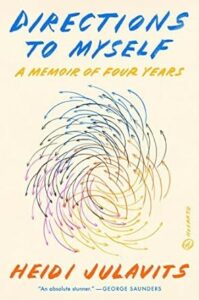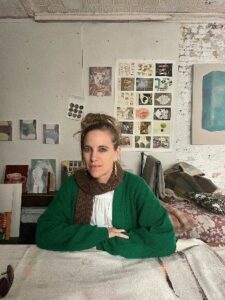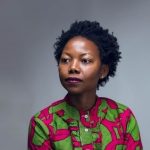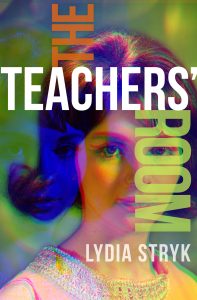The U.S. Embassy Literature Series – Celebrating Women’s History Month
A reading and discussion with Heidi Julavits, moderated by Anna Winger
 Directions to Myself, a memoir of locating where you are – so you know where you’re going. One day Heidi Julavits sees her son silhouetted by the sun and notices he is at the threshold of what she calls “the end times of childhood.” Who is my son becoming, she asks herself – and what qualifies me to be his guide? The next four years feel like uncharted waters. Rape allegations rock the university campus where Julavits teaches, unleashing questions of justice and accountability, education and prevention. Julavits begins to wonder how to prepare her son to be the best possible citizen of the world he’s about to enter. And what she must learn about herself to responsibly steer him. Using the past and present as points of orientation, Directions to Myself examines the minutiae of family life alongside knottier questions of politics and gender. Through it all, Julavits discovers the beauty and the peril of telling stories as a way to locate ourselves and help others find us.
Directions to Myself, a memoir of locating where you are – so you know where you’re going. One day Heidi Julavits sees her son silhouetted by the sun and notices he is at the threshold of what she calls “the end times of childhood.” Who is my son becoming, she asks herself – and what qualifies me to be his guide? The next four years feel like uncharted waters. Rape allegations rock the university campus where Julavits teaches, unleashing questions of justice and accountability, education and prevention. Julavits begins to wonder how to prepare her son to be the best possible citizen of the world he’s about to enter. And what she must learn about herself to responsibly steer him. Using the past and present as points of orientation, Directions to Myself examines the minutiae of family life alongside knottier questions of politics and gender. Through it all, Julavits discovers the beauty and the peril of telling stories as a way to locate ourselves and help others find us.
 Heidi Julavits is an associate professor at Columbia University’s School of the Arts. She received her BA from Dartmouth College and MFA from Columbia University. Julavits is the author, most recently, of Directions to Myself (Hogarth, 2023), and The Folded Clock: A Diary (Doubleday, 2015), a New York Times Notable Book. She is also the author of four novels, including The Vanishers (Doubleday, 2012), winner of the PEN New England Fiction Award, and The Mineral Palace (Putnam, 2000), her first novel and a finalist for the Young Lions Literary Award. She is co-editor, with Sheila Heti and Leanne Shapton, of the bestselling Women in Clothes (Blue Rider 2014). Julavits’s short fiction and essays have appeared in the New Yorker, New York Times Magazine, Harper’s, McSweeney’s, and New York Magazine, among others, and have been anthologized in Best American Short Stories and Best American Travel Essays. Recipient of a 2007 Guggenheim fellowship, Julavits is a founding editor of The Believer magazine. Heidi Julavits is a Spring 2024 Fellow at the American Academy in Berlin.
Heidi Julavits is an associate professor at Columbia University’s School of the Arts. She received her BA from Dartmouth College and MFA from Columbia University. Julavits is the author, most recently, of Directions to Myself (Hogarth, 2023), and The Folded Clock: A Diary (Doubleday, 2015), a New York Times Notable Book. She is also the author of four novels, including The Vanishers (Doubleday, 2012), winner of the PEN New England Fiction Award, and The Mineral Palace (Putnam, 2000), her first novel and a finalist for the Young Lions Literary Award. She is co-editor, with Sheila Heti and Leanne Shapton, of the bestselling Women in Clothes (Blue Rider 2014). Julavits’s short fiction and essays have appeared in the New Yorker, New York Times Magazine, Harper’s, McSweeney’s, and New York Magazine, among others, and have been anthologized in Best American Short Stories and Best American Travel Essays. Recipient of a 2007 Guggenheim fellowship, Julavits is a founding editor of The Believer magazine. Heidi Julavits is a Spring 2024 Fellow at the American Academy in Berlin.
 Anna Winger is a writer, producer and creator of such television series as Deutschland83 (Amazon), Unorthodox (Netflix) and Transatlantic (Netflix). She is also the author of a novel, This Must Be the Place (Riverhead), a radio series for NPR Worldwide called Berlin Stories, and personal essays that have appeared in the New York Times Magazine, the Frankfurter Allgemeine Zeitung, and the Süddeutsche Zeitung. American and British, she was raised in Kenya, Massachusetts and Mexico. She studied at Columbia, worked for many years as a photographer, and finally settled in Berlin, where she lives with her family. She has received Emmy, Peabody and Adolf Grimme awards for her work.
Anna Winger is a writer, producer and creator of such television series as Deutschland83 (Amazon), Unorthodox (Netflix) and Transatlantic (Netflix). She is also the author of a novel, This Must Be the Place (Riverhead), a radio series for NPR Worldwide called Berlin Stories, and personal essays that have appeared in the New York Times Magazine, the Frankfurter Allgemeine Zeitung, and the Süddeutsche Zeitung. American and British, she was raised in Kenya, Massachusetts and Mexico. She studied at Columbia, worked for many years as a photographer, and finally settled in Berlin, where she lives with her family. She has received Emmy, Peabody and Adolf Grimme awards for her work.
 The author also succeeds in building bridges across the decades and carefully analysing the parallels to current trends throughout Europe.
The author also succeeds in building bridges across the decades and carefully analysing the parallels to current trends throughout Europe. Directions to Myself, a memoir of locating where you are – so you know where you’re going. One day Heidi Julavits sees her son silhouetted by the sun and notices he is at the threshold of what she calls “the end times of childhood.” Who is my son becoming, she asks herself – and what qualifies me to be his guide? The next four years feel like uncharted waters. Rape allegations rock the university campus where Julavits teaches, unleashing questions of justice and accountability, education and prevention. Julavits begins to wonder how to prepare her son to be the best possible citizen of the world he’s about to enter. And what she must learn about herself to responsibly steer him. Using the past and present as points of orientation, Directions to Myself examines the minutiae of family life alongside knottier questions of politics and gender. Through it all, Julavits discovers the beauty and the peril of telling stories as a way to locate ourselves and help others find us.
Directions to Myself, a memoir of locating where you are – so you know where you’re going. One day Heidi Julavits sees her son silhouetted by the sun and notices he is at the threshold of what she calls “the end times of childhood.” Who is my son becoming, she asks herself – and what qualifies me to be his guide? The next four years feel like uncharted waters. Rape allegations rock the university campus where Julavits teaches, unleashing questions of justice and accountability, education and prevention. Julavits begins to wonder how to prepare her son to be the best possible citizen of the world he’s about to enter. And what she must learn about herself to responsibly steer him. Using the past and present as points of orientation, Directions to Myself examines the minutiae of family life alongside knottier questions of politics and gender. Through it all, Julavits discovers the beauty and the peril of telling stories as a way to locate ourselves and help others find us. Heidi Julavits is an associate professor at Columbia University’s School of the Arts. She received her BA from Dartmouth College and MFA from Columbia University. Julavits is the author, most recently, of Directions to Myself (Hogarth, 2023), and The Folded Clock: A Diary (Doubleday, 2015), a New York Times Notable Book. She is also the author of four novels, including The Vanishers (Doubleday, 2012), winner of the PEN New England Fiction Award, and The Mineral Palace (Putnam, 2000), her first novel and a finalist for the Young Lions Literary Award. She is co-editor, with Sheila Heti and Leanne Shapton, of the bestselling Women in Clothes (Blue Rider 2014). Julavits’s short fiction and essays have appeared in the New Yorker, New York Times Magazine, Harper’s, McSweeney’s, and New York Magazine, among others, and have been anthologized in Best American Short Stories and Best American Travel Essays. Recipient of a 2007 Guggenheim fellowship, Julavits is a founding editor of The Believer magazine. Heidi Julavits is a Spring 2024 Fellow at the American Academy in Berlin.
Heidi Julavits is an associate professor at Columbia University’s School of the Arts. She received her BA from Dartmouth College and MFA from Columbia University. Julavits is the author, most recently, of Directions to Myself (Hogarth, 2023), and The Folded Clock: A Diary (Doubleday, 2015), a New York Times Notable Book. She is also the author of four novels, including The Vanishers (Doubleday, 2012), winner of the PEN New England Fiction Award, and The Mineral Palace (Putnam, 2000), her first novel and a finalist for the Young Lions Literary Award. She is co-editor, with Sheila Heti and Leanne Shapton, of the bestselling Women in Clothes (Blue Rider 2014). Julavits’s short fiction and essays have appeared in the New Yorker, New York Times Magazine, Harper’s, McSweeney’s, and New York Magazine, among others, and have been anthologized in Best American Short Stories and Best American Travel Essays. Recipient of a 2007 Guggenheim fellowship, Julavits is a founding editor of The Believer magazine. Heidi Julavits is a Spring 2024 Fellow at the American Academy in Berlin. Anna Winger is a writer, producer and creator of such television series as Deutschland83 (Amazon), Unorthodox (Netflix) and Transatlantic (Netflix). She is also the author of a novel, This Must Be the Place (Riverhead), a radio series for NPR Worldwide called Berlin Stories, and personal essays that have appeared in the New York Times Magazine, the Frankfurter Allgemeine Zeitung, and the Süddeutsche Zeitung. American and British, she was raised in Kenya, Massachusetts and Mexico. She studied at Columbia, worked for many years as a photographer, and finally settled in Berlin, where she lives with her family. She has received Emmy, Peabody and Adolf Grimme awards for her work.
Anna Winger is a writer, producer and creator of such television series as Deutschland83 (Amazon), Unorthodox (Netflix) and Transatlantic (Netflix). She is also the author of a novel, This Must Be the Place (Riverhead), a radio series for NPR Worldwide called Berlin Stories, and personal essays that have appeared in the New York Times Magazine, the Frankfurter Allgemeine Zeitung, and the Süddeutsche Zeitung. American and British, she was raised in Kenya, Massachusetts and Mexico. She studied at Columbia, worked for many years as a photographer, and finally settled in Berlin, where she lives with her family. She has received Emmy, Peabody and Adolf Grimme awards for her work. NoViolet Bulawayo is the author of the novels Glory and We Need New Names, which was recognized with the Hurston/Wright Legacy Award, the Pen/Hemingway Award, the LA Times Book Prize Art Seidenbaum Award for First Fiction, the Etisalat Prize for Literature, the Fred Brown Literary Award, the Betty Trask Award, the Barnes and Noble Discover Award (second place) and the National Book Foundation “5 Under 35” Fiction Selection. We Need New Names was also shortlisted for the International Literature Award, the Man Booker Prize, and the Guardian First Book Award. NoViolet earned her MFA at Cornell University where she was a recipient of the Truman Capote Fellowship. She has taught fiction writing at Cornell and Stanford Universities. She grew up in Bulawayo, Zimbabwe, and is currently writing full-time from the wherevers.
NoViolet Bulawayo is the author of the novels Glory and We Need New Names, which was recognized with the Hurston/Wright Legacy Award, the Pen/Hemingway Award, the LA Times Book Prize Art Seidenbaum Award for First Fiction, the Etisalat Prize for Literature, the Fred Brown Literary Award, the Betty Trask Award, the Barnes and Noble Discover Award (second place) and the National Book Foundation “5 Under 35” Fiction Selection. We Need New Names was also shortlisted for the International Literature Award, the Man Booker Prize, and the Guardian First Book Award. NoViolet earned her MFA at Cornell University where she was a recipient of the Truman Capote Fellowship. She has taught fiction writing at Cornell and Stanford Universities. She grew up in Bulawayo, Zimbabwe, and is currently writing full-time from the wherevers. Since October 2022, Anne Potjans has been a postdoctoral researcher in the EU-funded research project Tales of the Diasporic Ordinary. Aesthetics, Affects, Archives at Humboldt-Universität zu Berlin, where she currently investigates the relationship between queer subcultural spaces and discourses on race and racism in Germany and the United States. Earlier in 2022, she completed her doctoral degree with a dissertation on “‘Why Are You So Angry?’” – The Uses of Rage and Anger in Black Feminist Literature” in the American Studies program at Humboldt and is a joint winner of Peter Lang’s competition New Perspectives in Black Studies, for which she received a publishing contract with Peter Lang in 2021. Apart from that, she has worked on diasporic connections between African American and Black German feminist autobiographical writing in the post-World War II period and the intersections of Blackness, sexuality, and racial visibility in German film productions. She was an exchange faculty in the Honors program at the University of Washington in the fall of 2019 and has presented and published her research both nationally and internationally.
Since October 2022, Anne Potjans has been a postdoctoral researcher in the EU-funded research project Tales of the Diasporic Ordinary. Aesthetics, Affects, Archives at Humboldt-Universität zu Berlin, where she currently investigates the relationship between queer subcultural spaces and discourses on race and racism in Germany and the United States. Earlier in 2022, she completed her doctoral degree with a dissertation on “‘Why Are You So Angry?’” – The Uses of Rage and Anger in Black Feminist Literature” in the American Studies program at Humboldt and is a joint winner of Peter Lang’s competition New Perspectives in Black Studies, for which she received a publishing contract with Peter Lang in 2021. Apart from that, she has worked on diasporic connections between African American and Black German feminist autobiographical writing in the post-World War II period and the intersections of Blackness, sexuality, and racial visibility in German film productions. She was an exchange faculty in the Honors program at the University of Washington in the fall of 2019 and has presented and published her research both nationally and internationally.
 dwest town, two teachers set eyes on each other and find it hard to look away.
dwest town, two teachers set eyes on each other and find it hard to look away.